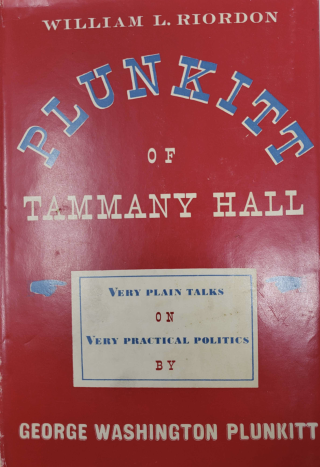Mayor Eric Adams says he plans to write a memoir about the corruption scandal currently engulfing his administration. “All this is going in my book,” he told reporters at City Hall a few days ago. “This is going to be one of the chapters that you’re all going to reflect on.” Let’s hope so. Adams is facing charges of fraud, bribery, and soliciting foreign campaign donations—and that just seems to be for starters. Prosecutors in Manhattan and Brooklyn have ongoing investigations into Adams and his tight circle of friends and advisers. More indictments and revelations of misconduct appear inevitable. He should get writing now.
If the Mayor is looking for literary inspiration, someone still legally allowed to make contact with him might slip him a copy of “Plunkitt of Tammany Hall”—a slim, curious book published in 1905 that still explains a lot about New York City politics and human behavior, generally. The book is a collection of twenty-one “very plain talks on very practical politics” supposedly delivered by George Washington Plunkitt, a Hell’s Kitchen “ward boss” at the turn of the twentieth century. Plunkitt was a loyal defender of Tammany, the corrupt political machine that dominated the city for a century. The son of penniless Irish immigrants, he argued that making money in politics wasn’t just O.K., it was downright patriotic. “I seen my opportunities and I took ’em,” he said, discussing the fortune he made during his long career. He is perhaps the most eloquent philosopher of corruption America ever produced.
In recent weeks, hearing Adams and his allies begin to mount a defense of his conduct, I thought of Plunkitt. “This is the airline-upgrade corruption case,” Alex Spiro, the Mayor’s celebrity defense attorney, told reporters the other day. Yes, the Mayor had accepted seat upgrades from an airline affiliated with the Turkish government. But so what? “That’s what airlines do,” Spiro said. “They do it every day. They do it for V.I.P.s. They do it for congresspeople.” Plunkitt didn’t know what airlines were, but he would have nodded all the same. “Nobody thinks of drawin’ the distinction between honest graft and dishonest graft,” he said. “There’s all the difference in the world between the two.” He claimed that while he and his Tammany colleagues made money from inside information, arranging city contracts, and collecting multiple public salaries at once, they never went in for “dishonest” graft, like blackmailing saloonkeepers, “workin’ in” with gamblers, or pilfering the city treasury. “The books are always all right,” Plunkitt said. “Everything is all right.”
